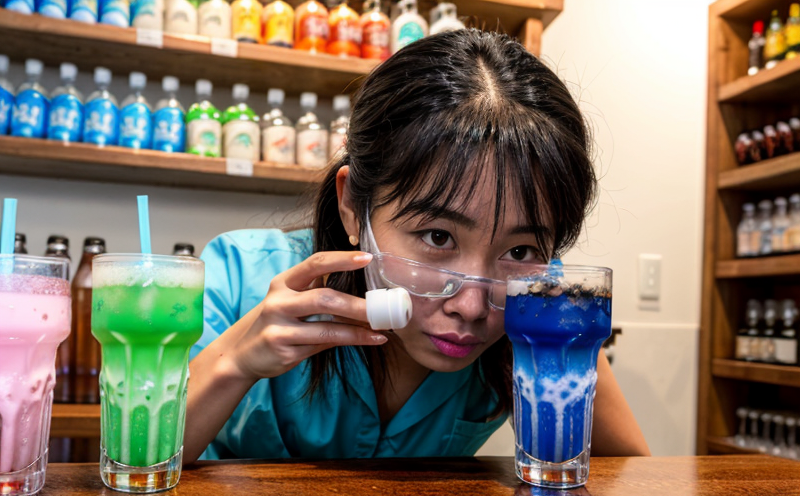USDA Quality Control Microbiology Testing in Beverages
The United States Department of Agriculture (USDA) quality control microbiology testing is a critical component in ensuring the safety and quality of beverages. This service ensures that products meet stringent standards set by regulatory bodies such as USDA, FDA, and international standards like ISO 17025 and ASTM E691.
Beverage companies rely on USDA microbiology testing to verify that their products do not contain harmful microorganisms or excessive spoilage bacteria. This service is essential for maintaining consumer trust and complying with legal requirements. The testing process involves several steps, including specimen collection, preparation, inoculation into selective media, incubation, and final identification.
For instance, in the case of a soft drink manufacturer, samples are collected from various stages of production, such as raw materials, intermediate products, and finished goods. These samples undergo testing for specific indicators like total viable counts (TVC), coliforms, E. coli, Salmonella spp., Listeria monocytogenes, and pathogenic yeasts and molds.
The use of selective media allows for the differentiation between various types of microorganisms present in the sample. This helps in identifying potential contamination sources early on. The results are reported back to the client within a specified timeframe, typically 5-7 business days from receipt of the sample.
- Specimen Collection: Samples are collected using sterile techniques to avoid cross-contamination.
- Inoculation: Prepared samples are inoculated into selective media to enhance detection of specific microorganisms.
- Incubation: The inoculated plates are incubated under controlled conditions to allow growth and differentiation of colonies.
- Identification: Once the colonies have grown, they are identified using various methods such as biochemical tests or mass spectrometry.
The USDA microbiology testing service is not just about meeting regulatory requirements; it also plays a vital role in maintaining brand reputation. By consistently delivering safe and high-quality products, companies can build long-term relationships with customers and stakeholders.
Moreover, this testing ensures that the beverages meet the nutritional claims made on labels. For example, if a product is marketed as "no added sugar," USDA microbiology testing helps confirm the absence of harmful microorganisms while also verifying the claimed sugar content.
Why It Matters
The importance of USDA quality control microbiology testing cannot be overstated. Compliance with regulatory standards not only protects consumers but also ensures that companies remain competitive in a global market. Non-compliance can lead to product recalls, legal actions, and damage to brand reputation.
In addition to compliance, this service helps beverage manufacturers improve their processes continuously. By identifying potential contamination sources early on, companies can implement corrective measures before they affect the final product. This proactive approach leads to higher-quality products and reduced waste throughout the supply chain.
From a public health perspective, ensuring that beverages are free from harmful microorganisms is crucial. Consumers expect safe and wholesome drinks, and failing to meet these expectations can have serious consequences. By adhering to USDA microbiology testing standards, companies contribute to maintaining public confidence in food safety.
Benefits
The benefits of USDA quality control microbiology testing extend far beyond compliance with regulations. Companies that invest in this service gain several advantages:
- Improved Product Quality: Early detection of contamination allows for timely corrective actions, leading to higher-quality final products.
- Predictive Maintenance: Regular testing helps identify potential issues before they become major problems, reducing the risk of recalls and product withdrawals.
- Enhanced Brand Reputation: Consistently delivering safe and high-quality beverages strengthens brand loyalty and attracts new customers.
- Competitive Advantage: Compliance with USDA standards positions companies as leaders in food safety and quality, differentiating them from competitors.
- Legal Protection: Demonstrated compliance reduces the risk of legal action and financial penalties associated with non-compliance.
- Consumer Trust: Safe products build trust with consumers, leading to increased sales and customer satisfaction.
In summary, USDA quality control microbiology testing is essential for maintaining product safety, ensuring regulatory compliance, and enhancing brand reputation. Investing in this service provides a competitive edge and long-term benefits for beverage manufacturers.
Why Choose This Test
- Accurate Results: Our laboratory adheres to international standards like ISO 17025, ensuring accurate and reliable results.
- Expertise: Our team of microbiologists has extensive experience in beverage testing, providing deep industry knowledge.
- Comprehensive Testing: We offer a wide range of tests covering various aspects of beverage safety and quality.
- Fast Turnaround: Results are typically available within 5-7 business days from receipt of the sample.
- Custom Solutions: Our team can tailor testing protocols to meet specific client needs and regulatory requirements.
- Confidentiality: We maintain strict confidentiality regarding all client information and test results.
We understand that every company has unique challenges, and we strive to provide solutions that address these challenges effectively. Our commitment is to deliver accurate, timely, and reliable microbiology testing services that exceed industry expectations.





